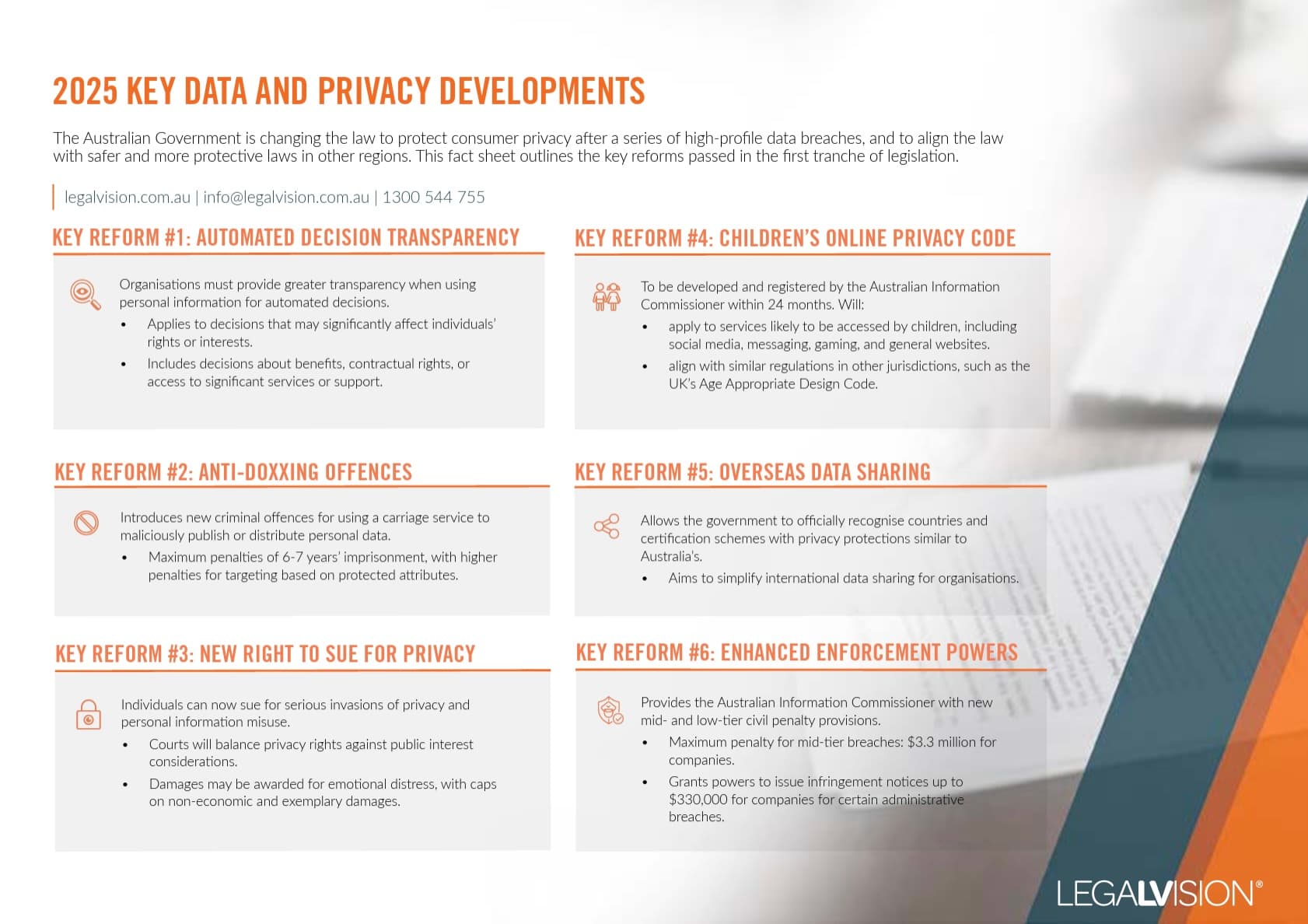In Short
- Digital identity refers to online identities used for authentication, authorisation, and verification.
- Businesses in Australia must comply with privacy laws like the Privacy Act 1988 and follow the Digital Identity Framework.
- Strong security measures, identity verification, and data breach response plans are essential for protecting digital identities.
Tips for Businesses
Ensure compliance with Australian privacy laws by securing digital identities with multi-factor authentication and encryption. Educate employees and customers about digital identity risks, and establish clear policies on managing and protecting personal information.
Australian businesses should consider several legal factors regarding digital identity in today’s digital age. A digital identity is an online or networked identity claimed on the internet by an individual, organisation, or electronic device. As businesses increasingly rely on digital transactions and online services, understanding the legal considerations surrounding digital identities is crucial. This article provides an overview of the legal aspects of digital identity in Australia.
What is Digital Identity?
Digital identity refers to an online or networked identity that an individual, organisation, or electronic device adopts or claims online. Digital identity includes:
- usernames;
- passwords;
- social security numbers;
- purchasing behaviour; and
- more.
Businesses in the private sector use digital identity to:
- verify the identity of customers and employees;
- secure transactions; and
- ensure compliance with legal standards.
Key Components of Digital Identity
Digital identity includes:
- identification;
- authentication;
- authorisation; and
- federation.
Identification establishes a user’s identity. Authentication verifies the claimed identity.
Continue reading this article below the formLegal Framework in Australia
Australia has a robust legal framework governing digital identities.
Privacy Act 1988
The Privacy Act 1988 (Cth) regulates the handling of personal information. Businesses must comply with Australian Privacy Principles (APPs) when collecting, using, and storing digital identities.
Digital Identity Framework
The Australian Government introduced the Digital Identity Framework, which includes the Trusted Digital Identity Framework (TDIF) for creating and using digital identities and the Identity Exchange, which verifies digital identities across services.
This is sometimes nicknamed the ‘Digital ID Bill’ or ‘Digital ID Act’ and is the country’s attempt to create a digital ID system.

This factsheet outlines the Australian Government’s strengthened consumer privacy laws in 2025 following major data breaches and their alignment with global standards.
Notifiable Data Breaches Scheme
Under the Notifiable Data Breaches (NDB) scheme, businesses must notify affected individuals and the Office of the Australian Information Commissioner (OAIC) about breaches involving digital identities likely to result in serious harm.
Legal Considerations for Businesses
You must navigate several legal considerations when dealing with digital identities.
Compliance with Privacy Laws
Compliance with privacy laws is essential. Depending on the information collected, notify individuals about the collection of personal information. Implement robust security measures to protect digital identities and provide individuals with access to their digital identity information and the ability to correct it.
Identity Verification Processes
Adopt robust identity verification processes to prevent fraud and ensure the authenticity of digital identities. Multi-factor authentication (MFA) and biometric verification effectively enhance security.
Data Breach Response Plan
Develop a comprehensive data breach response plan. Include systems for identifying potential breaches, clear steps for notifying affected parties and authorities where necessary, and measures to mitigate the impact of a breach.
Record Keeping and Documentation
Maintain accurate and up-to-date records of digital identity transactions for compliance, auditing, and dispute resolution. Ensure that these records are securely stored and easily accessible for authorised personnel.
Practical Tips
Security Measures
Implement encryption, secure access controls, and update protocols to address threats.
Education
Educate employees and customers about digital identity security to reduce identity theft and fraud.
Technology
Use advanced technologies like biometrics and blockchain for secure identity management.
Policies
Develop and communicate clear policies on digital identity management and security responsibilities.
Key Takeaways
Digital identity is crucial for online transactions and interactions. Your company must comply with privacy laws and the Digital Identity Framework. This involves:
- implementing strong security measures;
- conducting identity verification processes;
- educating employees and customers about protecting digital identities;
- developing clear policies; and
- creating response plans for data breaches.
By following these guidelines, you can effectively manage digital identities and guarantee secure and compliant operations.
If your business needs assistance with digital identity, LegalVision’s experienced privacy lawyers can assist as part of our LegalVision membership. For a low monthly fee, you will have unlimited access to lawyers to answer your questions and draft and review your documents. Call us today on 1300 544 755 or visit our membership page.
Frequently Asked Questions
The Privacy Act 1988 and the Digital Identity Framework regulate the handling and use of digital identities. Businesses must comply with privacy laws and secure identity management.
Implement multi-factor authentication and a data breach response plan. Ensure strong security measures and educate employees and customers on digital identity protection.
We appreciate your feedback – your submission has been successfully received.












